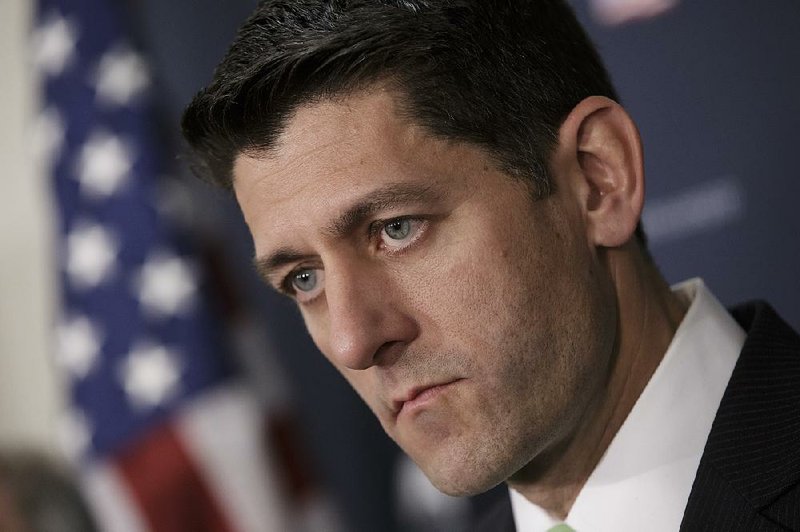WASHINGTON -- House Republicans, under the leadership of Speaker Paul Ryan, seem likely to miss Friday's statutory deadline on passing an annual budget.
A day after he called a news conference to deny that he will run for president this year, Ryan insisted Wednesday that he hasn't given up on the House's obligation to pass its annual spending blueprint, even though Friday's deadline looks impossible to meet.
"You know me, I want to pass a budget," said the Wisconsin Republican, his party's 2012 vice presidential nominee. "I think we should pass a budget, and we're still talking with our members on how we can get that done."
The tea party lawmakers who prompted the exit of Ryan's predecessor, John Boehner, are pushing against a bipartisan spending deal that Boehner reached with President Barack Obama last fall.
"It's better to do no budget this year than a bad budget," Jim DeMint, president of the Heritage Foundation think-tank, said in an interview, echoing the sentiments of many conservatives in the House. Boehner, despite his troubles with those in his caucus, met the budget deadline each of the five years of his speakership.
"It's extremely frustrating," GOP Rep. Kevin Cramer of North Dakota said of the prospect of missing the approaching budget deadline. He praised Ryan's communication skills and attempts to involve lawmakers in his deliberations, but added: "It's admirable in some ways but not producing results."
Ryan was chairman of the House Budget Committee for much of Boehner's speakership and crafted the "Ryan budget" that would have transformed Medicare into a voucher program for millions of people. The measure never became law.
In previous years when Democrats were in control of Congress, Ryan repeatedly blasted them when they didn't get budgets done by the deadline, even backing a law that would have cut off lawmakers' paychecks if they failed to pass a budget.
Failing to pass a budget has few real-world consequences for lawmakers, and GOP leaders in the House and Senate are instead moving ahead with the annual spending bills that determine agency operating budgets.
That process is just getting underway, though it, too, faces divisions in the House. Democrats are likely to oppose many of the bills if they're laced with conservative policy "riders," and conservatives have problems with the spending levels.
The budget is not the only area where House Republicans are lagging under Ryan's leadership. Little significant legislation has been moving, and negotiations over a bill to address Puerto Rico's fiscal crisis have proceeded in fits and starts. It's unclear whether a just-released Puerto Rico bill backed by Ryan will get the needed support.
Ryan has set his sights higher than the nitty-gritty of legislating. He has put committees to work on developing policies on issues from health care to national security to poverty that can serve as a "governing agenda" for the GOP. He has pledged to release the proposals ahead of the GOP convention in July, giving party members a program to run on should they want to distance themselves from the eventual GOP nominee.
Ryan also is helping ensure that GOP candidates have the campaign cash to get elected. He raised $17.2 million in the first three months of 2016 and transferred more than $11 million to the National Republican Congressional Committee.
Ryan made clear Tuesday that he will not be the party's standard-bearer if front-runner Donald Trump or the other candidates -- Sen. Ted Cruz of Texas and Ohio Gov. John Kasich -- flame out during a contested convention. Party leaders fear that Trump and Cruz would be defeated in November, costing the GOP not only the White House but control of the Senate.
On the budget, Boehner faced a comparable situation in 2014. It was the second year of a budget deal with Obama -- negotiated by Ryan -- and some conservatives were reluctant to go along with higher agency budget levels. Boehner was working with a smaller GOP majority but had an advantage since conservatives were relatively sheepish after the 2013 government shutdown that they sparked.
Information for this article was contributed by Scott Bauer of The Associated Press.
A Section on 04/14/2016
